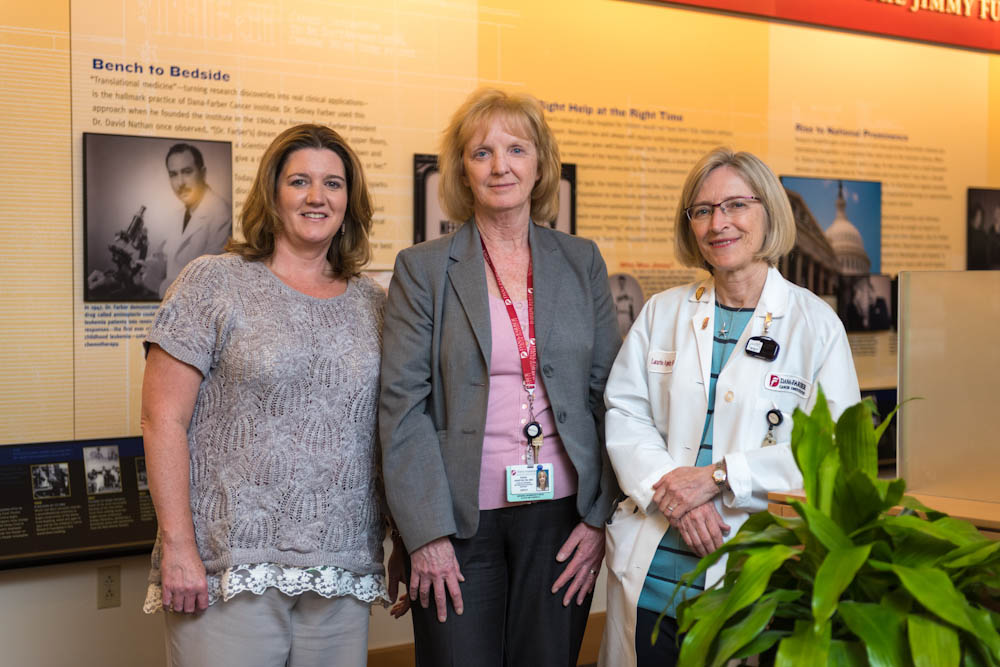Dana-Farber oncology nurses have grown accustomed to being asked how they can do such a difficult job every day. But talk with them and you’ll learn that they feel far more blessed than burdened by these challenges.
In honor of National Nurses Week May 6-12, we asked four Dana-Farber nurses to reflect on what drew them to the field of oncology, and what they enjoy most about it.

“It’s a privilege to help people on their cancer journey,” says Laurie Appleby, NP, of the Lank Center for Genitourinary Oncology. “The human connection we make with patients and families, and the many phases we go through with them, is a wonderful experience.”
Appleby and her colleagues say they were inspired to enter nursing because they saw it as a noble profession. When, as practicing nurses, they met and worked with cancer patients and their caregivers, they felt compelled to make it their area of focus.
“I undoubtedly do know why I do what I do,” says Trisha Robinson, RN, BSN, clinical nurse coordinator for Pediatric Oncology at Dana-Farber/Boston Children’s Cancer and Blood Disorders Center. “I am lucky to be in a position where I can incorporate the knowledge of the science and biology of oncology with caring for the physical, emotional, and educational needs of our patients.”
Whatever their role at Dana-Farber, nurses and nurse practitioners here believe that helping individuals and their loved ones face cancer treatment makes for very satisfying work.
“When I interviewed at Dana-Farber, I could feel a tangible difference about the way people here feel about their jobs – a shared sense of dedication,” says Susan Anastas, RN, BSN, program manager for Clinical Informatics. “That’s a big part of why I love working here, too. There’s a true sentiment across the Institute that we are all here together for the patients.”
Anastas, who previously worked in an emergency department, no longer has direct patient contact. Still, she knows she is improving care by helping design systems that clinical colleagues use in treating patients. “The safer these systems, the safer and more efficiently the patients can be cared for,” she says.
This sense of being part of a bigger whole is a strong motivator for Dana-Farber nurses, no matter what their job responsibilities.
“In overseeing the daily flow of the pediatric clinic, I work closely with our clinic medical director, nurse director, and operations manager to assess issues and develop solutions to help improve the care we provide,” says Robinson. “I also work with a very talented and supportive team that provides high-level care.”
Having a common goal is another draw.
“Oncology nursing is special, at least partly, due to the insidious nature of cancer,” says John Christopher, RN, OCN, who works administering chemotherapy, blood products, medication, and hydration to patients at Dana-Farber/Brigham and Women’s Cancer Center in clinical affiliation with South Shore Hospital. “Clinicians are able to team up with patients and families to help fight the disease. The relationships established are special.”
And the stronger the bond, nurses agree, the more comfortable the patient will feel.
“In the end, that’s the bottom line; as a nurse, your job is to make people comfortable,” says Appleby. “If a person feels comfortable and safe and cared for, they will do better in their treatment. If they feel listened to, it validates their concerns.”

Trisha undoubtedly helped save my husband’s life! Nurses are heroes! Happy Nurses Week!
Trisha is one of the best ever! Took such great care of me 20 years ago and we’re still in touch today. Thanks for everything you do Trish!!!!